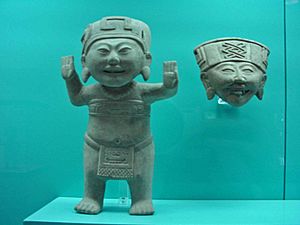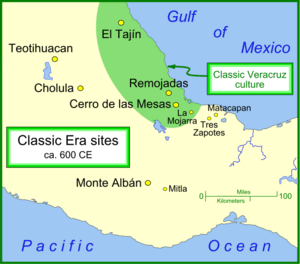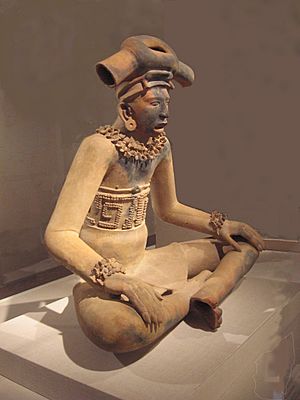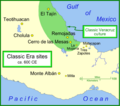Remojadas facts for kids
Remojadas (pronounced remo-HAH-das) is the name for an ancient culture, an archaeological site, and a unique art style. This culture thrived on Mexico's Veracruz Gulf Coast. It existed from about 100 BCE to 800 CE. The Remojadas culture is part of the bigger Classic Veracruz culture.
The Remojadas site itself has not been fully explored. Most of the early research was done in 1949 and 1950 by Alfonso Medellin Zenil. More study is still needed to learn all its secrets.
Amazing Figurines
Remojadas is famous for its pottery and hollow ceramic figurines. Thousands of these detailed and varied figures have been found. They were discovered in many places, including ancient burials and trash heaps.
These figurines show many different things. They include gods, leaders, and everyday people. You can also find figures of animals like dogs and deer. A very special type of figurine is the "Sonrientes," which means "smiling faces." These figures look like curious children.
Many Remojadas figurines were also musical instruments. Some worked as flutes, whistles, or ocarinas. Some animal figures even had wheels! These wheeled figures might have been toys or, more likely, items used in special ceremonies. This is one of the few times wheels were used in the Americas before Europeans arrived.
You might notice that many figurines have filed teeth. This was a common practice in the Remojadas culture. The first figurines were made by hand. Later on, people started using molds to create them. The style of these figurines is very similar to those made by the Mayan civilization.
The Smiling Faces
The Sonrientes (smiling faces) are the most well-known Remojadas figurines. They have wide smiles on faces that are shaped almost like triangles. Sometimes, you only find the heads. Other times, the heads are attached to childlike bodies with arms stretched out and palms showing. The smiles are very distinct, often showing teeth. Sometimes, a tongue even sticks out between the teeth.
Male Sonrientes figures are usually nude or wear loincloths. Female figures wear skirts. Both often have special bands or necklaces on their chests. They also wear some kind of headdress. The headdress, and sometimes the skirts, show a special symbol or a stylized animal.
Smiling figures are rare in Mesoamerican art. The large number of Sonrientes figures suggests they had a very important role in Remojadas society. What that role was is still a mystery. Some experts, like Mary Ellen Miller and Karl Taube, believe that many of these smiling figures might represent performers.
Images for kids
-
A large terracotta figurine of a young chieftain in the Remojadas style. In his 1957 book on Mesoamerican art, Miguel Covarrubias speaks of Remojadas' "magnificent hollow figures with expressive faces, in majestic postures and wearing elaborate paraphernalia indicated by added clay elements."
300 - 600 CE; Height: 31 in (79 cm).
See also
- In Spanish: Remojadas para niños
 | Georgia Louise Harris Brown |
 | Julian Abele |
 | Norma Merrick Sklarek |
 | William Sidney Pittman |







